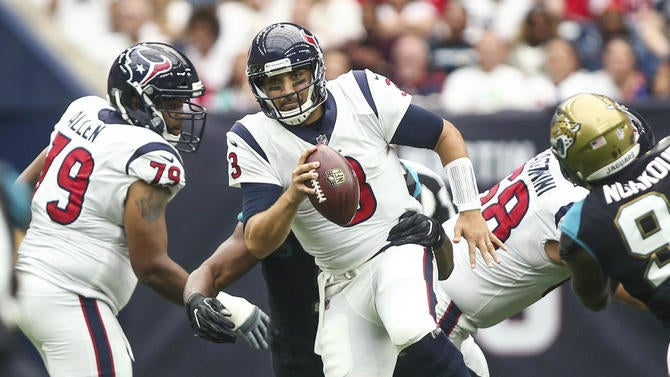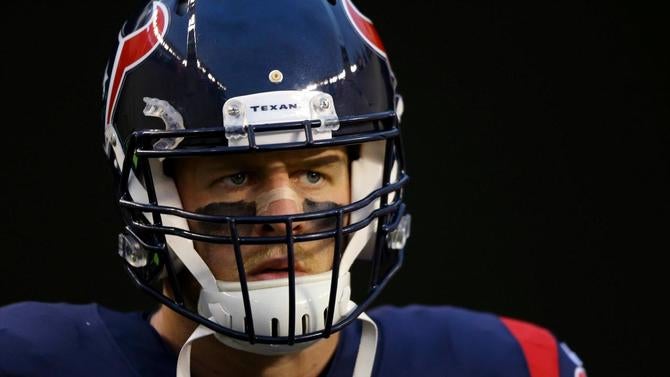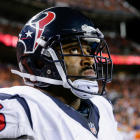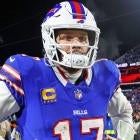Three veteran players under contract held out when training camps opened in late July because of unhappiness with their deals. Left tackle Donald Penn reported to the Raiders shortly after the team's second preseason game. Rams All-Pro defensive lineman Aaron Donald ended his holdout right before the regular season started. The only one still holding out is Texans left tackle Duane Brown.
Brown has two years left on the six-year, $53.4 million extension he signed in 2012. Skipping offseason workouts triggered a $250,000 base salary de-escalator to reduce Brown's 2017 income from $9.65 million to $9.4 million. Each week of the regular season that Brown misses is costing him a little more than $550,000 in salary. Brown is scheduled to make an unguaranteed $9.75 million in 2018.
Holdouts extending into the regular season by players already under contract are extremely rare. Previously, strong safety Kam Chancellor held out 54 days in 2015 before returning to the Seahawks without any changes to his contract.
I was involved in the longest holdout of a player seeking changes to an existing contract during the 21st century. One of the players I helped represent as an agent was wide receiver Keenan McCardell. His holdout in 2004 ended after 82 days when the Buccaneers dealt him to the Chargers right before the trading deadline for third- and sixth-round picks in the 2005 NFL Draft. Quarterback Carson Palmer's contract dispute with the Bengals in 2011 is excluded because he didn't want a contract modification. He retired when his trade request wasn't initially accommodated.
McCardell's holdout stemmed from him feeling misled by coach Jon Gruden about renegotiating his contract. Gruden, who was the power broker in the Buccaneers organization, gave McCardell assurances that his contract would be addressed when he approached him after a 2003 season in which he played in the Pro Bowl after catching 84 passes for 1,174 yards.
The four-year contract McCardell signed with the Buccaneers in 2002 was compensating him for the No. 2 receiver role he was expected to assume when he joined the team. McCardell had become Tampa Bay's clear-cut primary receiving threat after Keyshawn Johnson was given a paid leave of absence for the final six games of the 2003 season for being a disruptive influence. He felt his salary should be more in line with his expected contributions on a go-forward basis, especially after Johnson was traded to the Cowboys during the offseason.
McCardell had already experienced the harsh realities of the business of football with the Jaguars, and that played a part in his thinking. He was released from a more lucrative contract at an inopportune time following a 2001 season where he caught 93 passes for 1,110 yards because of Jacksonville mismanaging the salary cap.
Once Gruden's handpicked general manager Bruce Allen (now Redskins president) was brought in from the Raiders, where Gruden had previously been head coach, he deferred to him on contract matters. Allen was unwilling to significantly address McCardell's contract primarily because he didn't want to establish a precedent of giving into a player's demands through a holdout.
Brown's holdout is 58 days and counting without a resolution in sight. Since there are usually similar dynamics with holdouts, my experiences during McCardell's may be able to shed some light how on Brown's situation might develop as the stalemate continues.
Proving value through the team's struggles
Brown's value has been apparent in Houston's first two games. The offensive line has been in disarray. The Texans gave up 10 sacks to the Jaguars in a season-opening upset loss at home. The offensive line wasn't much better in a Week 2 road contest against the Bengals in which the only touchdown was courtesy of a 49-yard run from rookie quarterback Deshaun Watson. The only thing that hasn't seemingly gone Brown's way is that the Texans escaped Cincinnati with a narrow victory to even their record at 1-1.

When it came to McCardell's holdout, the beginning to Tampa Bay's season was better than we ever could have imagined for our case. Or so we thought. The Buccaneers suffered injuries at wide receiver during an 0-4 start. Joey Galloway sustained a groin injury in the season opener that kept him out six weeks. It was the worst game statistically for Gruden's offense to that point in his tenure. Joe Jurevicius was already sidelined for several more games. An aging Tim Brown, who signed during training camp, was ineffective replacing McCardell. The Buccaneers had trouble scoring points in a couple of losses where McCardell may have made a difference in the outcome of those games. The team was averaging a mere 12.3 points per game a quarter of the way through the season.
Kennard McGuire, Brown's agent, is probably viewing Houston's offensive struggles as confirmation of his client's value to the team just as we did with Tampa Bay's offensive struggles. Unfortunately for McGuire and Brown, the Raiders signing Penn to a two-year, $18.7 million extension (worth up to $20.6 million though incentives) where just $3 million of his 2018 base salary is fully guaranteed doesn't help their cause. At 34, Penn is two years older than Brown. According to Pro Football Focus, Brown are Penn are the only two tackles to play at least 400 offensive snaps during the 2016 season that gave up just one sack.
The power of precedent
The early-season misfortune didn't provide us enough leverage for the Buccaneers to start working on a new deal for McCardell. That's because a majority of teams attempt to preserve contractual precedents at almost all costs. The concern is making a concession to one player will open the floodgates for other players to expect similar treatment in the future. In actuality, teams should be able to make distinctions based on each player's particular circumstances without jeopardizing the integrity of a policy.
The deck is stacked against Brown getting a new deal, even though offensive tackle is clearly a more glaring weakness without him. The Texans have a long-standing policy against in-season contract negotiations. Historically, Houston has finalized extensions with players heading into a contract year as the regular season approaches. This year, wide receiver DeAndre Hopkins and tight end C.J. Fiedorowicz signed lucrative new deals a day after the final preseason game. Defensive end J.J. Watt's six-year extension in 2014 that made him the NFL's highest paid non-quarterback came four days before the first regular season game. In 2012, quarterback Matt Schaub received an extension a day before the regular season opener.
Houston is also reluctant to rework contracts with multiple years remaining. The two big exceptions have been Watt and wide receiver Andre Johnson. The Texans gave Watt a new deal with two years left on his contract and renegotiated Johnson's contract in 2010 with five years to go.
Addressing Brown's contract would potentially cause the Texans headaches in the future. Outside linebacker Whitney Mercilus is outperforming his four-year, $26 million extension that runs through the 2019 season. He would likely expect the Texans to do the same with his contract next season when he was two years left if Brown gets a new deal. Jadeveon Clowney, the first overall pick in the 2014 NFL draft, or his agent (Bus Cook) might have an issue with Brown getting taken care of for a second time when the outside linebacker/defensive end has the same time remaining on his contract and is coming off a breakout Pro Bowl season. Watt might feel justified in seeking a new deal sooner rather than later as well, even though he's under contract through the 2021 season if he returns to or is close to his previous form after two back surgeries last year.

McGuire is well aware of Houston's policies and precedents, thanks to his representation of Andre Johnson. The seven-time Pro Bowler forfeited a $1 million first game of the regular season roster bonus in 2014 during his quest to get his $10.5 million 2015 base salary guaranteed because of his absence from offseason activities. Johnson reported to training camp on time without any adjustment to his contract. Hopkins having a breakout season while Johnson was starting to decline at 33 led to his release following the season when there wasn't a trade market for him.
The two sides reportedly haven't much meaningful dialogue about resolving Brown's situation. The lack of substantive communication isn't unusual when both sides are firmly entrenched in their respective positions. We didn't talk to Allen for long stretches of time during McCardell's holdout. Neither side wants to make an overture to break the impasse because the gesture will probably be perceived as a sign of weakness from the other side.
Any thoughts by Brown's camp that owner Bob McNair would intervene to end the dispute seem remote. He is firmly backing general manager Rick Smith's stance. We were in a similar situation because the Glazer family, who own the Buccaneers, had a hands-off approach of operating their team. The Texans overcame the loss of Watt, the three-time NFL Defensive Player of the Year, last season to give up the fewest yards in the NFL. Jah Reid, who can play both guard and tackle, was just signed off the street to help shore up the offensive line. Smith may feel Penn's extension is further proof that Brown is paid appropriately since the two deals are comparable. Because of these dynamics, Smith may not feel a sense of urgency with Brown even though the next three opponents are the Patriots, Titans and Chiefs and The Texans could easily be 1-4 with hopes of repeating as AFC South champions slipping away by the middle of October.
The code of the locker room
The code among players is don't get involved in a teammate's contractual matters unless being supportive. Those that aren't usually won't voice an opinion publicly. Brett Favre criticizing Javon Walker for a minicamp holdout in 2005 is one of the more high-profile exceptions.
Things can begin to change when a player's absence starts impacting on-field success. Earl Thomas' public comments in 2015 suggested that he was getting frustrated with Chancellor's absence. Simeon Rice made a personal plea publicly to McCardell early in Tampa Bay's season to end his holdout, which fell on deaf ears, because the offense's trouble scoring points. The only touchdown in Tampa Bay's first two games was by the defense.
As much as players are in favor of other players getting paid, there will likely be a growing sentiment privately among team members that Brown is abandoning them the longer his lengthy contract dispute lasts. Brown's teammates will welcome him back with open arms once his dispute is resolved, just like Chancellor's did. There won't be any lingering resentment over his holdout.
The possibility of a trade
Brown has been pretty quiet during his holdout. The only comment he has made was shortly before the regular season when he said he's definitely playing football this season. Brown becoming vocal as the holdout progresses could be a signal that he wants to be traded. The Texans haven't shown any interest in moving Brown right now and didn't capitulate in 2014 when Johnson asked to be traded during his contract dispute.
Although Brown is 32 years old, the Texans would probably initially demand at least a 2018 first-round pick for him because good left tackles are rare commodities. Two teams that should have an interest in Brown if Houston is open to moving him are the Giants and Seahawks. McGuire would likely insist that any acquiring team address Brown's contract in the process. The trading deadline is October 31, the Tuesday after Week 8 of the season.
We shifted gears from wanting a new contract to a trade once it became apparent that the Buccaneers weren't going to budge. Ownership's strong support of Smith could help Brown soon recognize that his financial demands won't be met. This happened early in the regular season in McCardell's case.
Pursuing a trade wouldn't be done without Brown's approval and probably would originate from him. This concept also applies to the decision to hold out. McGuire works for Brown. It isn't the other way around. His job is to effectively execute Brown's wishes.
The idea was to become a big-enough distraction to force a trade. That's why we kept McCardell available to media outlets where he became increasingly more critical of Gruden and the Buccaneers organization in his numerous interviews.
Brown has so much more media at his disposal because of the advent of social media and the increased attention on the NFL. The NFL Network was in its infancy during McCardell's holdout and didn't have a wide audience so it wasn't a platform he could effectively use or have as many former players in the media at his disposal.
McGuire should ask Houston for permission to shop Brown to other teams, especially to those on a list of preferred destinations he and Brown put together, if a trade is going to be pursued so he isn't relying on the word of the team in assessing his client's potential trade market. Teams are usually reluctant to disclose other's interest in players they aren't inclined to deal. Houston may not give Brown permission, which could hamper these efforts, especially since keeping Brown is their preference. Some teams won't be willing to have conversations with an agent about acquiring a client under contract to another team without written confirmation of his availability out of fear of having tampering charges being filed against them.
Our NFL sources indicated to us that a couple of teams were interested in acquiring McCardell early in the season but Allen wasn't open to moving him at that time or willing to give us permission to seek a trade.
This only deepened the divide between the sides. Although Allen was adamant that McCardell wouldn't be traded, he re-evaluated his stance after Tampa Bay fell to 1-5, and the Chargers, who were a surprising team that year, lost Reche Caldwell to a season-ending knee injury right before the trading deadline. When the Chargers, who weren't on our preferred list, called prior to acquiring McCardell to inform us that a deal would be contingent on him honoring his existing contract for the remainder of the season, there weren't any objections on our end because of how badly we wanted a change of scenery. A new contract was negotiated early during the following offseason.
Finding the right button to push with Smith or McNair might become important to McGuire if a trade becomes the end game. A former colleague of Gruden's told me he hated confrontation. We had McCardell fly to Tampa about a week before the trading deadline for an impromptu meeting with Gruden where he was instructed to be extremely confrontational, which was out of character for him, because we thought that approach might help spur movement.
We wanted Gruden to get a taste of what life might be like if a disgruntled McCardell came back. Who knows how much that meeting prompted the trade but Gruden couldn't have been looking forward to an unhappy McCardell returning after getting fed up enough with Johnson the year before to send him home for the final few games of that season.
The Buccaneers were successful in recovering $1.5 million in signing bonus and roster bonuses from McCardell through a grievance filed against him because of the holdout. His $185,000 in fines for missing training camp were no longer enforceable after the trade because of a 1997 arbitration decision involving Kevin Greene.
The Greene precedent means that Houston wouldn't be able to collect the $1.6 million worth of fines that Brown racked up for his 40-day absence from training camp if he's with another team. Fortunately for Brown, none of the $12.5 million signing bonus he received in his 2012 extension can be recovered. The proration of the signing bonus ended in 2016.
Why sitting out the season is out
Brown signaling an eventual return may have been a tactical error, even though a willingness to miss the entire season probably would have been taken with a grain of salt. It would have just posturing for the Texans.
Sitting out the entire season would be counterproductive contractually. Houston would likely have Brown's contract tolled for a full year under the extension provisions in paragraph 16 of the standard NFL player contract, which would mean his deal wouldn't expire until after the 2019 season instead of the 2018 season.
We had a general timetable for McCardell returning to the Buccaneers for this reason. An exact date hadn't been determined but McCardell would have reported to the Buccaneers some time shortly after the trading deadline, which was after the sixth week of the season back then, because of an arbitration decision relating to Joey Galloway's 101-day holdout in 1999.
Seattle lost a grievance attempting to get Galloway's contact extended for an additional year under paragraph 16 because he held out for the first nine weeks of the 1999 season. The arbitrator didn't give a clear standard for how many missed weeks are necessary to trigger tolling. The NFLPA advised us that McCardell should return a little sooner than Galloway did to be on the safe side because teams can ask the commissioner for a roster exemption lasting up to two weeks for certain player absences (suspension, holdouts, etc.), which could keep them out of action during this time.
It is also the NFLPA's belief that the deadline for teams to sign their unsigned franchise and transition players, draft picks and restricted free agents, which is the Tuesday following the 10th week of the season, also applies to holdouts. After this date, which is November 14 this year, these players are prohibited from playing for the rest of the season. It remains to be seen whether returning at this deadline would be sufficient to prevent a contract from tolling.
Final thoughts
Brown is fighting an uphill battle getting any type of adjustment to his contract. The importance that teams place on preserving precedent can't be understated. It's hard to imagine the Texans making an exception to established team policy for Brown.
The team quickly imploding and it becoming painfully obvious to McNair and Smith that public sentiment is against them would likely be necessary. Typically, fans don't take a player's side in a contract dispute with a team in most instances. The public has difficulty relating to a player being unhappy with what, in their eyes, is a lucrative contract. McCardell was essentially reviled by the Buccaneers fans during his holdout. Brown probably has more goodwill built up as the longest-tenured Texans player while McCardell had only played two seasons in Tampa. Unusual circumstances are required for public sentiment to be with the player.
The best Brown may be able to do is get treated like Aaron Donald when he ended his holdout. The Rams waived Donald's training camp fines, didn't recover signing bonus they were entitled to collect and opted against voiding his 2017 and 2018 contract guarantees. In Brown's case, it would be only forgiveness of fines for his training camp absence.
Houston doesn't necessarily need to enforce their rights fully to deter future holdouts. Players with the resolve to forfeit salary by missing regular season games attempting to get a renegotiated contract will be few and far between.















